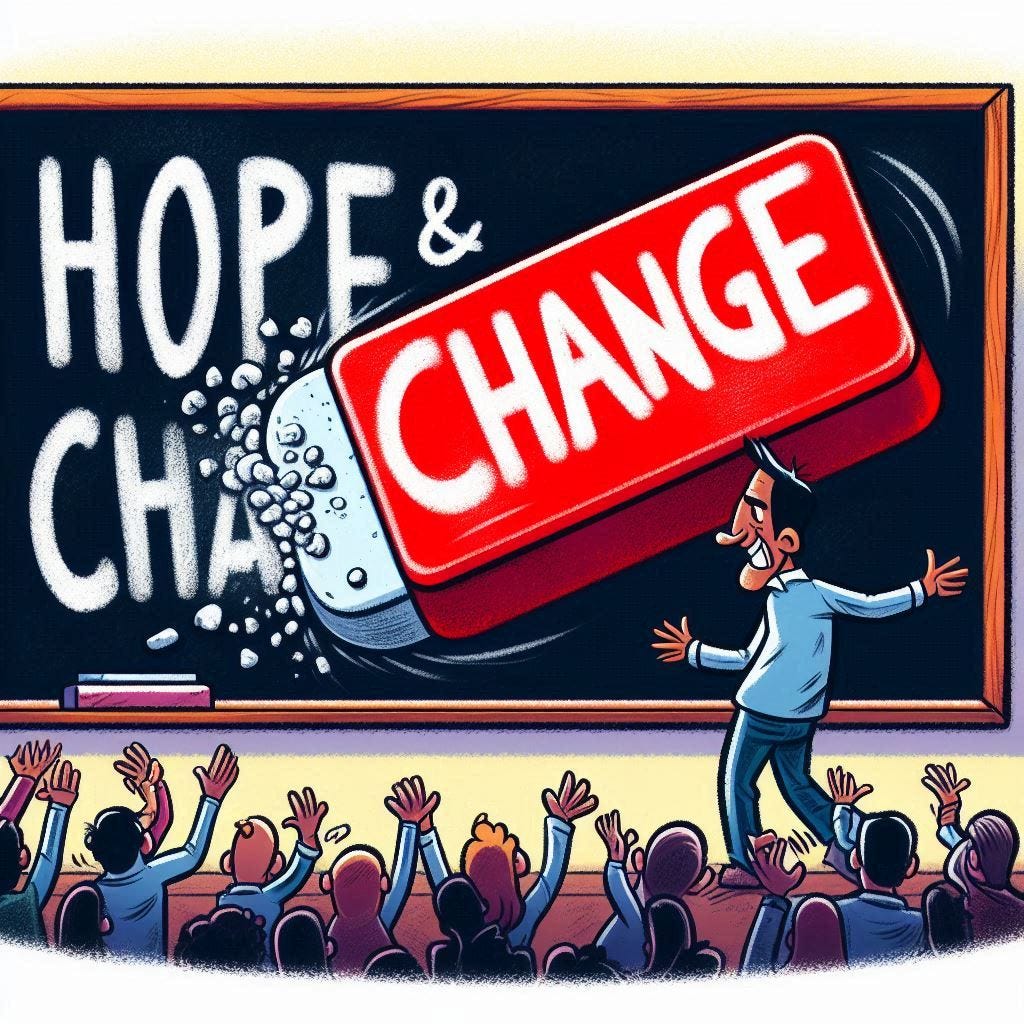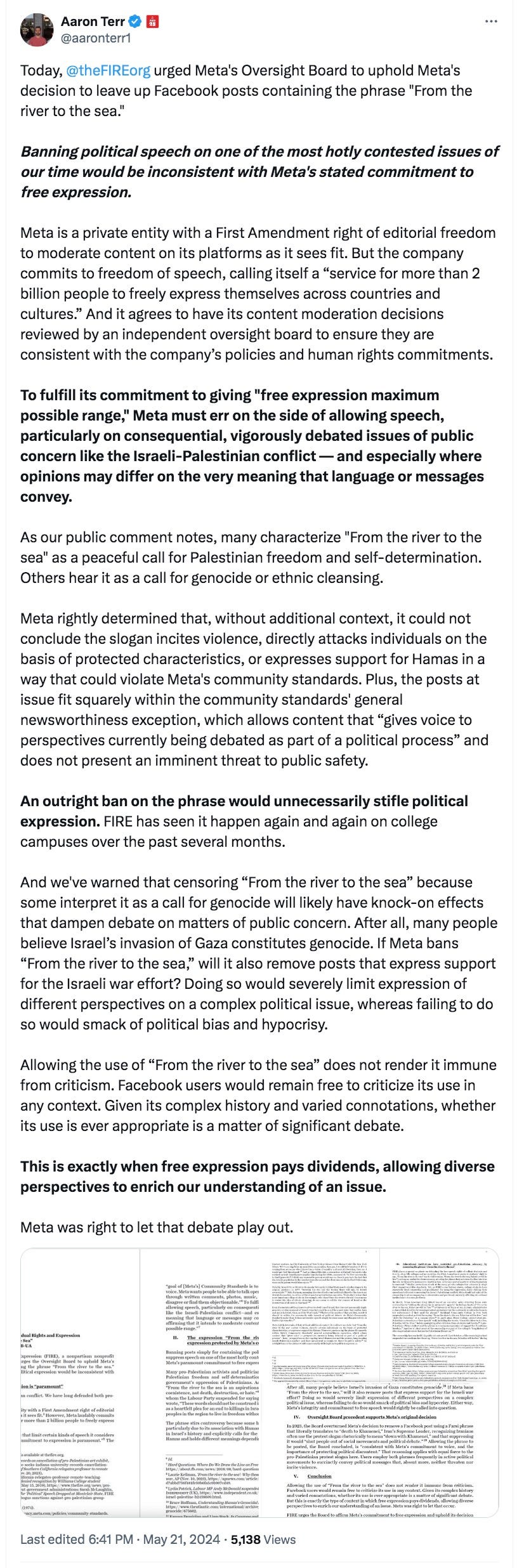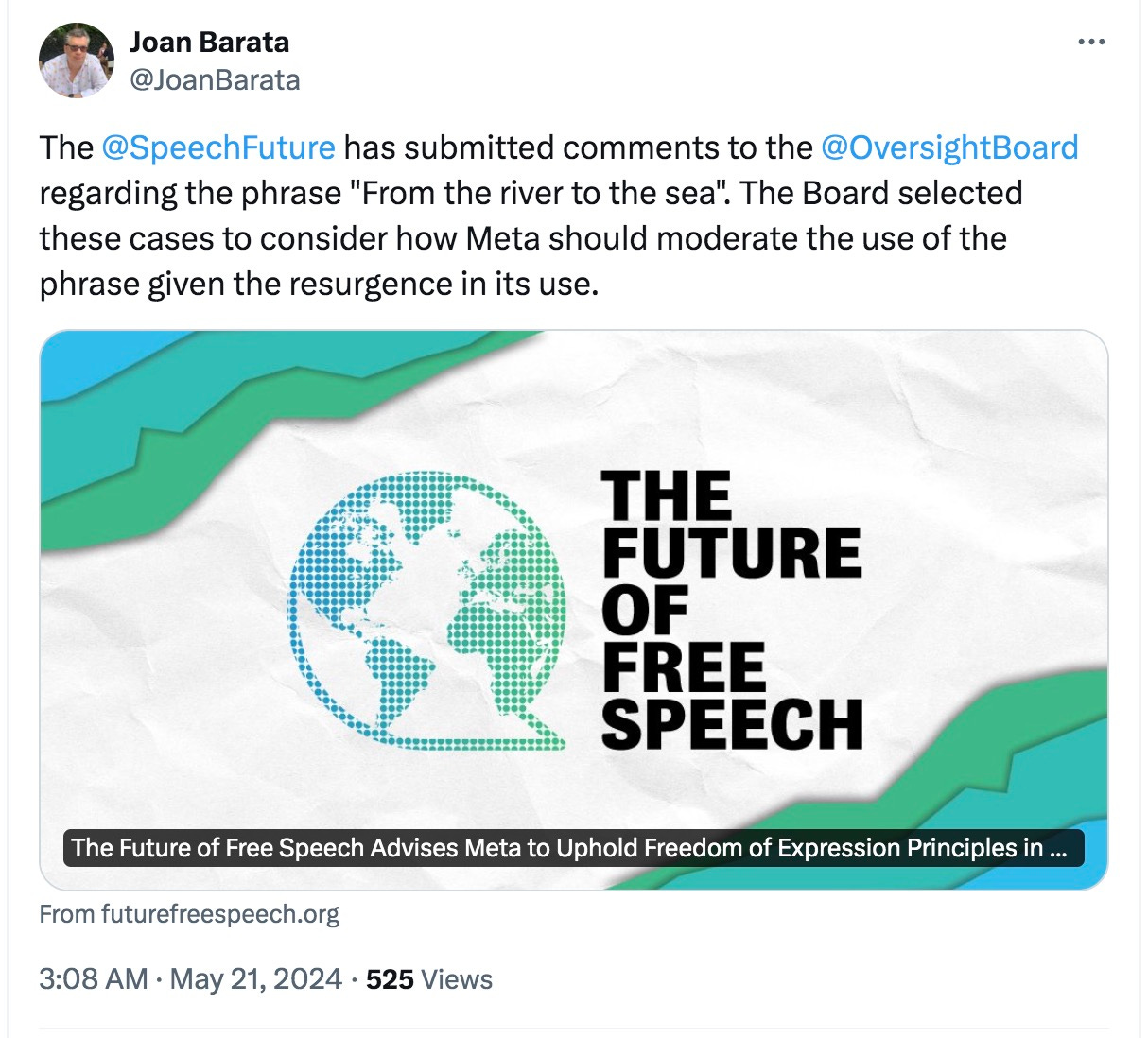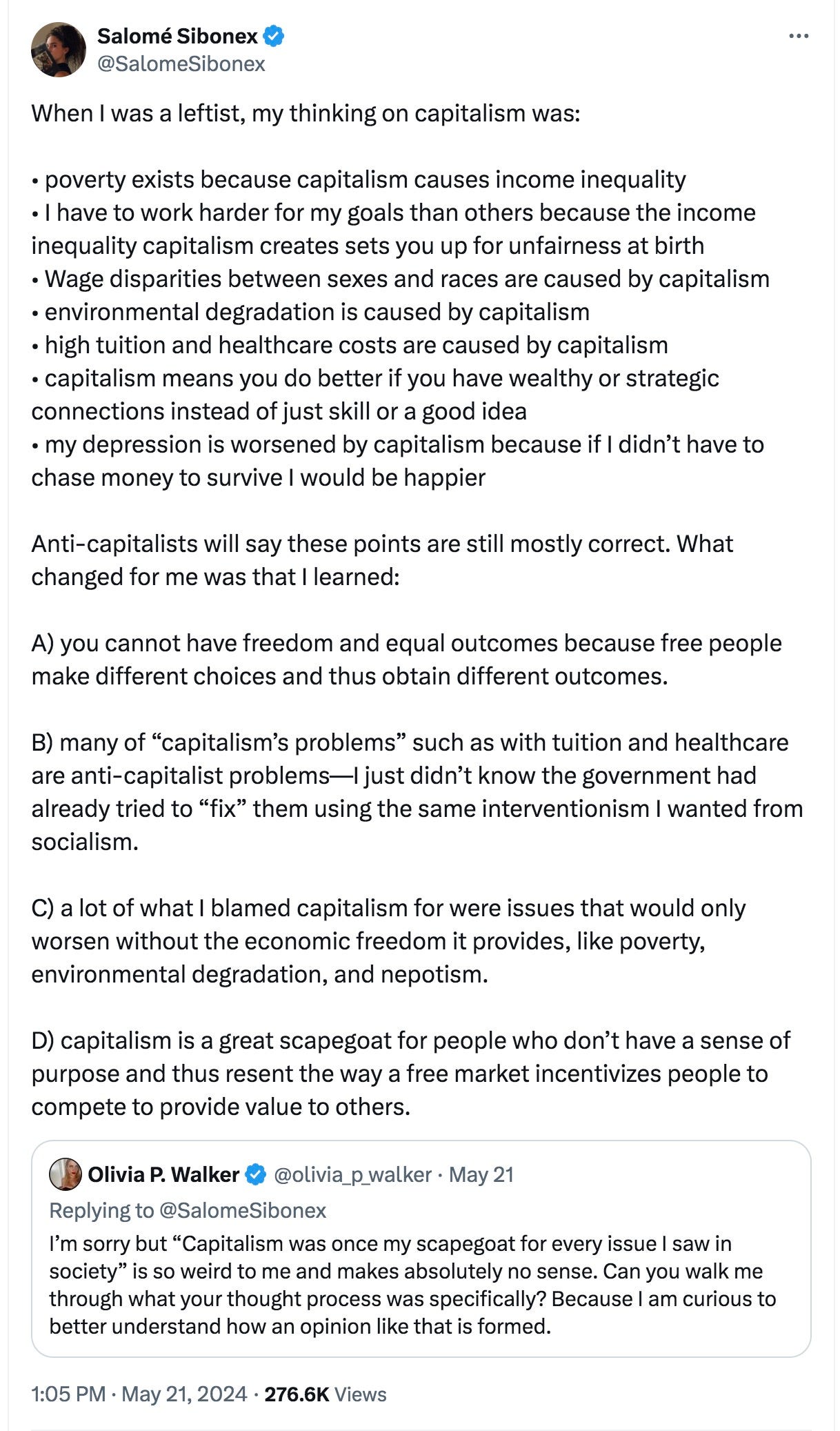E-Pluribus | May 22, 2024
Regretting the decline and fall of wokness; doom and gloom replaces hope and change; and the mother of all movements.
A round-up of the latest and best musings on the rise of illiberalism in the public discourse:
Michelle Goldberg: Wokeness Is Dying. We Might Miss It.
Michelle Goldberg, a self-described left-leaning, feminist who writes a column for the New York Times, thinks the reports of the success of wokeness have been greatly exaggerated and that the trend is actually in the opposite direction (a trend for which she grants at least one cheer.) Goldberg writes that contrary to erstwhile progressive Nellie Bowles’s contention in her new book that progressivism rules the institutional roost, wokeness is more or less on life support.
In her new book, “Morning After the Revolution: Dispatches From the Wrong Side of History,” Nellie Bowles, a former New York Times journalist grown disillusioned with both the mainstream media and the left, writes about the year 2020, when the combustible confluence of the pandemic, the murder of George Floyd and the prospect of Donald Trump’s re-election made politics and culture go “berserk.” She describes a liberal intelligentsia “wild with rage and optimism,” brimming with “fresh ideas from academia that began to reshape every part of society.” Her name for this phenomenon, often derided as “wokeness,” is the “New Progressivism,” and her book attempts, with varying degrees of success, to skewer it.
There is much about that febrile moment worth satirizing, including the white-lady struggle sessions inspired by the risible Robin DiAngelo and the inevitable implosion of Seattle’s anarchist Capitol Hill Autonomous Zone. Bowles dissects both in the book’s best sections. She seems to be inspired by the great works of 1960s and 1970s New Journalism about the absurdities of the counterculture, most famously Tom Wolfe’s “Radical Chic” and Joan Didion’s “Slouching Towards Bethlehem.” But “Morning After the Revolution” is undermined by Bowles’s lazy mockery and insupportable generalizations.
[. . .]
[M]y biggest disagreement with Bowles lies in her insistence that the movement she’s critiquing has triumphed. She describes the New Progressivism as the “operating principle of big business,” as well as the tech sector and academia. This week, speaking on the podcast of her wife, the Times Opinion writer turned heterodox media entrepreneur Bari Weiss, Bowles said, “The revolution didn’t end because it lost. It ended because it won.”
It didn’t, though. Even at the zenith of the George Floyd demonstrations, the corporate social-justice stuff was mostly window dressing; the operating principle of big business is and always was the pursuit of profit. And now, we’re in the middle of a furious reversal.
“Plenty of companies are reining in their rhetoric and in some cases action on issues such as sustainability and diversity,” said a recent Business Insider article titled “Woke No More.” Diversity, equity and inclusion departments, briefly prized, are being dismantled.
[. . .]
On college campuses, both the Gaza protests and the resulting crackdown have shattered the illusion that radical politics can be seamlessly integrated into elite academic institutions. Long-running arguments about speech and sensitivity have been turned on their heads as leftists demand the right to chant slogans that offend their classmates, while moderates and conservatives invoke the need to keep Jewish students safe from emotional as well as physical harm.
Amid all this upheaval, the era of content warnings and policing of microaggressions may have come to an end.
[. . .]
There are aspects of the New Progressivism — its clunky neologisms and disdain for free speech — that I’ll be glad to see go. But however overwrought the politics of 2020 were, they also represented a rare moment when there was suddenly enormous societal energy to tackle long-festering inequalities.
Read the whole thing.
Rafael A. Mangual: Whatever Happened to “Hope and Change”?
Given that Joe Biden has been either president or vice president for eleven of the past fifteen years, one might wonder how he can avoid responsibility for the bleak portrait of America the president painted for graduates of historically black men's liberal arts Morehouse College. (How a Democratic president gets away with speaking at an all-male college is a whole other topic.) At City Journal, Rafael Mangual highlights Barack Obama’s “hope and change” optimism that Joe Biden appears to have abandoned.
The idea that America is fundamentally hostile to black Americans is a pernicious lie that flouts reality anywhere you look. Ask yourself: Do the data emerging from litigation against Harvard’s and the University of North Carolina’s affirmative action programs suggest that the median black admit to those universities had grades and test scores ten times better than those of admits from other racial groups? Do the successful black professionals you know work ten times as long or hard as the similarly situated white professionals you know? Or is it your sense that American companies, universities, political parties, and nonprofit boards are making every effort to diversify their ranks—often at the expense of merit-based standards?
It’s worth remembering that the same man who gave last weekend’s dreadful speech at Morehouse made his way to the White House on a presidential ticket whose campaign slogan was “Hope and Change.” There’s an irony in that because Hope and Change is the antithesis of now-President Biden’s reelection campaign. Telling black college graduates that they will have to be ten times better than their white counterparts just to get a “fair shot” is not a hopeful message (let alone an accurate one). If anything, it seems perfectly calibrated to stoke despair.
Change is off the table, too, because, well, Biden is the incumbent—and not just any incumbent but one who has been in the White House, as either the top man or his Number Two, for 12 of the past 16 years, and who began serving in the U.S. Senate more than a half century ago. Biden’s party has enjoyed political control of one or both houses of Congress—and many state and city governments—for much of the past generation. One might reasonably conclude that, if Biden were capable of delivering change, he would have done so by now. One might also ask: Given all the power you’ve had access to for decades, why is the country still so overrun with racism, as you claim?
[. . .]
While unsurprising, it is nevertheless disappointing that Biden would squander an opportunity to inspire Morehouse’s class of 2024 with a message that is more hopeful, as well as a more accurate reflection of the country those graduates call home. Of course, it’s hard to sell yourself as a savior to a group without first convincing its members that they need saving.
Read it all.
Russell Blackford: The Rise of a Mega-Movement
At Quillette, Russell Blackford writes about the evolution of various movements to overcome oppression in the past century into a unified “mega-movement.” This amalgamation is the result of intersectionality which seeks to bring all forms of oppression under one umbrella. But this one-size-fits-all approach has, in Blackford’s view, “erase[d] liberalism’s traditional language of dissent.”
For [Australian journalist Guy] Rundle, the Social Justice Movement is best understood as a political expression of the values of the knowledge class: that is, a social class of people involved in scientific and scholarly inquiry, the creation of technology and cultural products (including art and literature in their various forms), and the production of public policy and law. On Rundle’s account, this class in its contemporary form arose after the Second World War. It gradually became larger, somewhat definite or identifiable, and increasingly powerful. Its members are cosmopolitan in outlook, detached from their local communities’ traditions and assumptions, and trained to think in highly abstract and flexible ways. In recent decades, they’ve evolved shared assumptions and values that have now become their version of common sense—of what seems obvious and undeniable.
If we follow Rundle’s account, therefore, the Social Justice Movement has behind it an entire social class—perhaps 30 percent of the population—that exercises significant power in today’s industrialised societies and implicitly supports the movement’s assumptions and goals. The Social Justice Movement focuses on revealing (and consequently opposing) hidden and overlapping layers of oppression endured by marginalised demographic groups, and this fits well with the vulgar postmodernism that has fed into the theory and practice of identity politics, especially since the 1980s.
Unsurprisingly to anyone familiar with the history of left-wing disenchantment with liberalism, which we can already witness to some extent in the 1960s, the Social Justice Movement includes elements that are not merely post-liberal but unashamedly anti-liberal. That is, elements of the movement explicitly reject liberal ideas of untrammelled public discussion—instead, they seek a partial closure of the public sphere to shut out what they perceive as harmful or hurtful speech. As Rundle observes, this attempt to constrain public discussion may, depending on the circumstances, be carried out through action by the state or by other powerful bodies. I’d only add that it might not be a “body” at all that attempts to close discussion or punish the advocates of politically unacceptable ideas. This can result from nothing more than informally organised or semi-organised tribal opinion and feeling.
Rundle views the rise of the Social Justice Movement with its distinctive priorities as something of a repeat of events in the late 1970s—though again, it strikes me as more of a continuation and intensification of the history of identity politics and associated tactics. He and I agree, however, that the later 1970s, and then the 1980s, saw a new concern within the political Left about issues to do with the representation and portrayal of demographic groups. Such issues were now treated as urgent in their own right, rather than as components of a wider struggle over economic power or individual liberty.
[. . .]
As identity politics developed from the mid-1970s through the 1980s and beyond, it produced a transformation in the language of the political Left. Terms such as toleration, free speech, individuality, spontaneity, personal autonomy, sexual liberation, and artistic freedom fell largely into disuse, if not disrepute. Even some of the language of equality—such as equal opportunity and equal rights—eventually suffered in this way, though the word equity is still doing well, often as part of a contemporary mantra: diversity, equity, and inclusion. Stocks have risen for diversity, inclusion, difference, identity, recognition, and community. In more politically radical circles, we can find ample references to subjugation(s) and domination.
The new language does not mean completely new political goals, but it reflects significantly changed emphases, principles, and values. Words such as individuality and spontaneity played a crucial role in the traditional language of liberalism such as we’d find in John Stuart Mill’s classic work On Liberty, and were used to defend experiments in living or personal eccentricities. By contrast, these are not important within the Social Justice Movement, which understands human beings as belonging to intersecting or overlapping identity groups rather than as unique individuals. Thus, an important vocabulary has been jettisoned: we have lost the words that we could once call upon to justify diversity of thoughts, desires, viewpoints, and policy preferences, as opposed to a diversity of demographic groups. And so, the new ideology erases liberalism’s traditional language of dissent.
Read it all here.
Around Twitter (X)
The Foundation for Individual Rights & Expression is urging Meta (aka Facebook) not to ban the phrase "From the river to the sea" from its platforms, and the organization The Future of Free Speech agrees:
Here’s former leftist Salomé Sibonex explaining how she used to think about capitalism, and what changed:
And finally, here’s Ayaan Hirsi Ali on Spain, Ireland and Norway’s decision to recognize a Palestinian state: “stupid or evil?”











Some good discussions here. A quick point about theory and method. Most people are fair-minded and concede that the aims of the social justice movement are reasonable and within the broad orbit of liberal progress. What few agree with is the methods adopted to achieve those aims; cancel culture, anti-white racism, mutilation of teenagers, conscious hypocrisy, anti-democratic coercion of institutions and fascistic abuse of language and thought. If they had invested more in dialogue than coercion, they would have won lots of arguments.
You have to be so crippled by ideological commitments and so hermetically sealed inside a social, political and intellectual bubble to say things this stupid and get paid (well) for them.
"On college campuses, both the Gaza protests and the resulting crackdown have shattered the illusion that radical politics can be seamlessly integrated into elite academic institutions."
LOL Did Michelle sleep through the last 50 years? If you had to describe the modern history of American academia in one sentence it would be: "radical politics can be seamlessly integrated into elite academic institutions." Didn't the New Left abandon and denounce the Archie Bunkers of the proletariat in order to dedicate their lives to "interrogating hegemonic texts", didn't everyone from Angela Davis to the Weathermen take up cozy sinecures in academia, where they sprinkled their alchemical jargon on everything till it came out looking like some form of Oppression? Didn't they just work 50 years to seize the means of cultural production? Sounds like a seamless integration to me!
OR: "however overwrought the politics of 2020 were, they also represented a rare moment when there was suddenly enormous societal energy to tackle long-festering inequalities."
The only thing 2020 represented was a top-down orchestrated nervous breakdown that would make Lady Macbeth seem stoic in comparison, as our elite class engaged in a full-spectrum tantrum to dislodge their White Whale aka the Orange Man. There was only "enormous societal energy" for our Left gentry to perform a weird Passion Play with George Floyd walking the Via Dolorosa, so they could take their Selma fetish out for a spin and cast their political opponents in the role of Gov Faubus.
People like Michelle Goldberg live so deeply embedded in the movie in their heads, where they are never not leading the masses on the road to Justice and Equality, that they've lost all contact with reality and babble the same exact nonsense for decades.
The only way to remain a member in good standing of our elite thinking class is to absolutely DO NO THINKING under any circumstances.